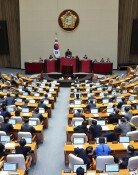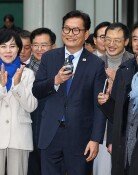Opposition Approval Rating Flying High
Opposition Approval Rating Flying High
Posted November. 29, 2005 07:51,
The ruling party recorded an approval rating of over 40% thanks to reforms after it took power, but it is rare for the opposition partys rating to approach 40%, according to polling experts.
Experts also said that the main opposition partys approval rating once plummeted to single digit just one-and-a-half year ago when it pushed for the impeachment of the president last year.
Analysts think that the surges in the rate can be attributed to things people are not satisfied with, such as the administrations handling of national affairs and internal dissension in the ruling party, and that both the head of the main opposition party and the mayor of Seoul, renowned for having restored the Cheonggyecheon, are pulling up the rating.
Divided, however, are people over the firmness of the high rating. Jeong Chang-kyo, chief analyst of the Korean Society Polling Institute, said, Since the ruling party has few issues that can reverse the situation, the main opposition partys rate could persist until next years local elections unless it makes a big mistake.
By contrast, Many people had no better choice other than just selecting the main opposition party, said a survey pundit on condition of anonymity. They should be regarded as swing voters who wait and see how the Grand National Party does things.
Just their own party-
With possibly their partys high approval, almost all the senior party members are keeping an eye on post of city mayors in the next years local elections.
Among the candidates for running for the mayorship of Seoul are Maeng Hyung-kyu, Lee Jae-oh, Hong Jun-pyo, Park Jin, and Park Gye-dong. Lee Kyu-taek, Kim Mun-su, Kim Young-sun, Jeon Jae-hee and Nam Kyung-pil are preparing for running for the governor of Gyeonggi Province.
It is natural that although the talent hunt committee was formed in September, not a single talent was hunted in practice. The committee made a list of 900 leading figures in each sector of society regardless of what party they support, but an even contact has not been made.
Although some of the committee talked about bringing in a high profile figure as a candidate for Seoul mayor, a group of candidates in the party opposed the idea so no one dares to speak of it.
It is said that when the committee tried to recommend a man, the former president of Seoul National Universitys general student association, to post in the district of Bucheon Gab, Gyeonggi in the 10/26 reelections, a senior lawmaker of the district strongly objected to that, saying, Never do that.
While lawmakers from the metropolitan area say, Why is the metropolitan area alone targeted, letting go of the Yeongnam area? lawmakers from the Yeongnam area fly into a rage, saying, We are doing well, what is the use of the headhunting? In short, the Yeongnam lawmakers are arguing that the party should seek candidates from areas where the chance of winning is slim like Honam or outside the party.
Some point out that both leading presidential candidates Park Geun-hye, head of the party, and Lee Myung-bak, mayor of Seoul are overlooking the war of turf among the party members as they focus on luring people on each ones side for the competition for a presidential candidate in the party.
The same applies to city and province parties who were given nomination and decision rights. An official of the Seoul City Council said, The toughest thing today is to see how the wind blows. In other words, he is keeping an eye only on who will be the presidential candidate- the partys head or the mayor of Seoul.
It is also pointed out that the party lacks mid- and long-term plans, and the partys function of developing strategies is paralyzed. The Yeouido lab, founded for those functions, receives 30 percent of the national subsidies for the Grand National Party, but some party members publicly question what on earth the lab is doing.
The lab sometimes holds seminars and discussion meetings, and releases reports like Yeouido Research and Issue Brief. The think-tank, however, has never made an impressive report on hot potatoes related to the partys course like real estate policies, tax cuts, or North Korea policies.
Under this situation, it is not rare that the party leadership and individual lawmakers disagree over issues like real estate, tax cuts and the multifunctional administrative city.
A congressman of a younger member group in Grand National Party expressed concern that the partys approval rating has yet to have enough content to support it. Another said that the party also realizes that the rate of people against the party also stands at nearly 50 percent.







